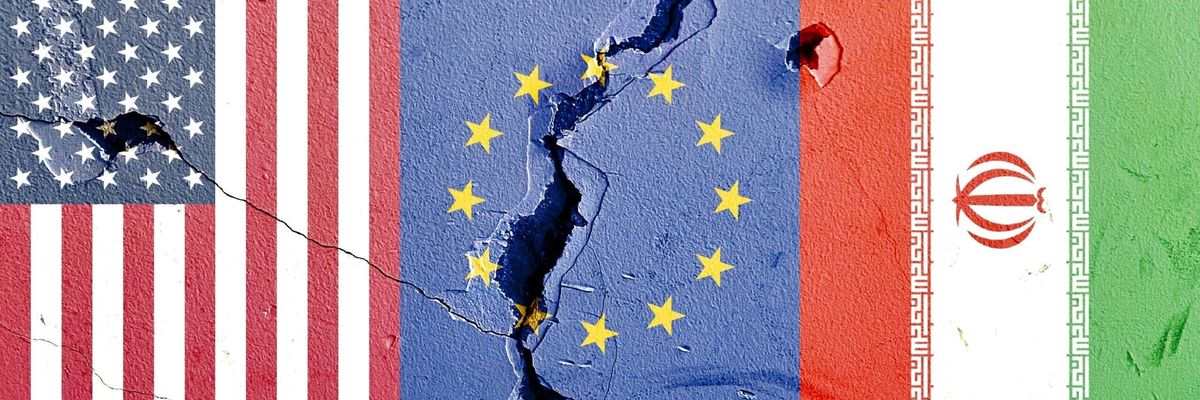The U.S. and European participants (Britain, Germany, and France) to the nuclear agreement with Iran have submitted on June 7 to the Board of Governors of the IAEA, the UN nuclear watchdog, a resolution seeking to censure Iran’s illicit activities.
Russian ambassador in Vienna and JCPOA negotiator Mikhail Ulyanov voiced his skepticism over the move, noting that it is “extremely doubtful” that such a resolution is the best way to address “the outstanding safeguards issues” when it comes to Iran.
From a purely technical point of view, there is a strong case to censure Iran’s activities as they indeed depart sharply from the country’s commitments under the JCPOA. Over the course of the past few years, Iran has increased its uranium enrichment levels to 60 percent, when the JCPOA-permitted level is 3.67 percent. Arms control experts note that 90 percent is the level suitable for weaponization, so Iran has come dangerously close to that threshold. Iran has also significantly expanded its centrifuge capacity, all while reducing the IAEA’s access to monitor and verify its activities.
Yet the political context paints a more complex picture. Iran’s transgressions followed the U.S. unilateral withdrawal from the agreement under Donald Trump. Iran kept fulfilling its commitments for more than another year. Since Joe Biden has not fulfilled, so far, his campaign pledge to return to the JCPOA, Iran continued to expand its nuclear program beyond the limits of the deal. The solution to the current stalemate is a swift and full return to the JCPOA by all sides, starting with the United States as the party that violated it first.
This is exactly why the resolution, if adopted, would be counterproductive. Although it does not call, yet, for Iran’s referral to the UN Security Council and emphasizes the need for a diplomatic solution, it shifts the blame for the stalemate in the JCPOA talks squarely onto Iran. Condemning Iran is a useful distraction from the failure of the Biden administration to remove a major stumbling block on the path to the JCPOA revival — the largely symbolic Iranian Revolutionary Guards foreign terrorist designation. The resolution can also be seen as a step in laying out the case against Iran in the court of international public opinion. It could certainly complicate future IAEA cooperation with Iran, as Tehran will be pushed to take some retaliatory measures — which, in turn, will facilitate the task of framing it as the principal culprit of the final collapse of the agreement.
Yet, despite the façade of the Western unity, it is far from certain that the United States and its European allies see eye to eye on this issue. It is becoming increasingly evident that for Washington, winning the blame game appears to be more important than reaching a deal with Iran. The E3 on the other hand, see the IAEA resolution as a useful pressure point to nudge Iran back towards compliance. This may be misguided tactics, but strategically the E3/EU goal is still to restore the JCPOA, not to allocate blame for its failure.
Moreover, there is a growing irritation in the EU at the Biden administration’s failure to reach the deal. Former senior European officials, such as former prime minister of Sweden Carl Bildt and former EU chief diplomat Javier Solana, criticized Biden’s passivity and warned of destabilizing consequences if the JCPOA is not restored. EU officials lobby Washington to find ways to lift the IRGC designation and scoff at what they see as the “irrationality” of the U.S. domestic politics when it comes to Iran.
The war in Ukraine added a new dimension to the European concerns. Bringing Iranian oil and gas reserves to the market would help the EU wean itself off its excessive dependence on the Russian supplies. Yet such trade is still subject to extra-territorial U.S. sanctions re-introduced by Trump and maintained by Biden.
EU investment in Iran is also subject to these sanctions. Following the conclusion of the original JCPOA in 2015, the French energy giant Totalcommitted one billion euros into development of the South Pars, estimated to be the world’s single largest gas field. It had to shelve those plans following the reimposition of U.S. sanctions. European officials insist that had the JCPOA be allowed to take root, EU energy security would have been further along than it is now.
Such divergent perspectives will not lead to an open U.S./EU split similar to the Trump-era as long as the negotiations on the JCPOA revival are not yet officially buried, however moribund their current status. Yet if Washington is more willing to escalate in order to blame Iran for the talks’ failure rather than get them actually succeed, it should not take its European allies for granted as fellow travelers down this slippery slope.
This article reflects the personal views of the author and not necessarily the opinions of the S&D Group or the European Parliament.














